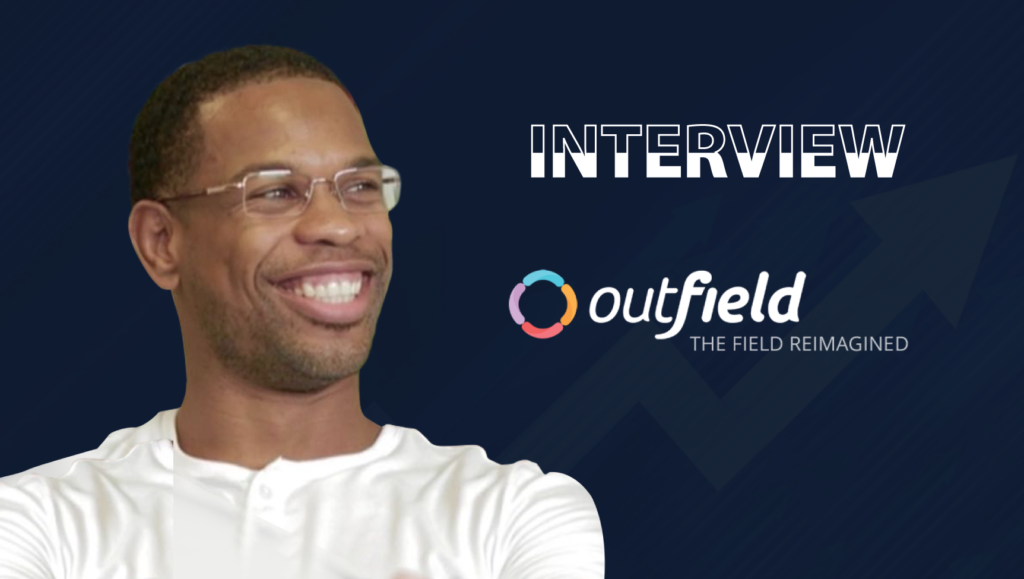Chief Executive Officer of Outfield Corporation Austin Rolling joins us in this SalesTechStar interview to share his biggest sales and entrepreneurial learnings.
______
Can you tell us a little about yourself Austin and a little about your professional journey so far. What have been some of your biggest career/tech startup learnings been so far?
I am the cofounder and CEO of Outfield. I am a third-generation entrepreneur. I started my first company, a fashion website, at the age of 20. I hold a BA in Communication from Eastern Michigan University and an MBA from Texas A&M University. I have spent the majority of my career working in the consumer goods and IT space in field sales and marketing, management, and business development roles.
My biggest career/tech startup learnings:
- Have a super thorough understanding of your customers, their pain points, and objectives. Tailor your value proposition to your findings, and remain flexible in your solution based on changes in requirements.
- Find ways to position yourself uniquely in competitive environments
- Your company’s talent and culture are the biggest assets you have. Prioritize these aspects of your business
In your years in the field or industry, what are the top 3 Business Development / Customer Development strategies that have worked for you/your team?
- The first touchpoint should always be about learning as much about the prospect as you possibly can. The call should be 20% you talking and 80% you listening. In this way, you’re shaping the next steps in the customer journey based on what they’ve already confess to be solving for.
- Manage your time as effectively as you can, all calls have an inflection point where incremental time spent on location will present diminishing returns. Your goal should be to try to understand when that point occurs so that you can minimize wasted opportunities.
- Leverage tools that can help you be smarter about your field activities. Tracking things like # of touchpoints with select individuals, timing attributes associated with visits, and location specific details will help you develop a clearer perspective over time about your accounts.
Read More: SalesTech Star Interview With Jim Dickie, Research Fellow At Sales Mastery
What are the top 5 Product Marketing (selling) tips in B2B sales you swear by?
- Given the opportunity, ask your customers and prospective customers a lot of deep questions
- Position yourself as a solution provider as opposed to a salesperson offering a good or service
- Manage your time (and other resources) as efficiently as possible
- Maintain your attitude at all times, by surrounding yourself with as much positive reinforcement as possible
- Be a professional. Remain a professional, and maintain that your customers and prospective customers treat you as such
In the Tech Sales/B2B Sales segment, what are some of the best ways for field sales teams to optimize their segmentation and outreach based on geography?
There are two key ways for field sales teams to optimize their segmentation and outreach: planning and tracking. For field sales, planning is crucial to success. You cannot merely go about your day and make stops on the fly. You have to think ahead and figure out how to best organize your day and make the best use of time. There are different variables to take into account, such as the traffic in certain areas or which stops require more time. This is why planning ahead is so important.
The second aspect is tracking information. There is so much data collected by field reps each day. Are you tracking it? If so, what are you doing with it? Collecting key data points like where reps stop, how long they spend there, what market conditions are like, and other KPIs are foundational in helping sales managers best determine how to allocate time and resources.
What SalesTech tools do you wish more Tech Sales/B2B Sales teams would use more of, which SalesTech products or categories of tools do you think will show falling demand over time?
More sales teams need to use tools built for the work they are doing. For example, the traditional CRM was not designed for the workflow of outside sales, therefore they won’t account for the nuances that make outside sides different. But there are salestech that is designed specifically for their workflow are available. They will prove much more effective in helping field sales and marketing teams. Increasingly, we are going to continue to see face to face interactions serve as critical for success in sales. This means tools that aren’t tailored to the face to face sales experiences easily will fall in demand. In fact, at Outfield we’re seeing it everyday among our customers and prospective customers that “universal tools” like excel are being abandoned for high quality field sales apps. Moreover, because these types of solutions are leveraging the APIs of top mapping apps (i.e. google maps), reps are moving away from relying on their independent versions in favor of the tools with territory management features laced on top.
Read More: SalesTech Star Interview With David Raab, Founder And CEO At The CDP Institute
What according to you are the top 5 things that B2B/Tech Sales leaders should always keep in mind when planning a Sales Strategy/Campaign for a new Tech tool/new Tech Product?
When developing and marketing a new product, don’t focus so much on executing the finished product the way you originally intended. Remain agile, stay in-sync with the product development team, and collectively build based on what you’re learning about your market and consumer base along this way. This will reduce unnecessary costs and wasted time, while landing you on target with a real solution to your intended customer base. Also, consider alternative uses. You may learn along the way that what you’re building is producing value for a market you never intended to serve.
What are your thoughts on the future of sales/salestech? How do you eventually see salestech play a role in the future role of the typical B2B/sales professional?
Companies that utilize outside sales teams are going to have to become smarter about their activities in a business world where competition is at an all time high. This equates to maximum output per unit of input. More specifically, said companies are going to be forced to think about how to get the most from their resources in an optimized way. This will lead to more deliberate approaches that rely on data. Closer attention will be paid to details that might have been overlooked in the past. Salestech vendors will need to build platforms that are capable of producing information that is useful to their customers, while at the same time helping them to understand information output. Salestech will help sales professionals think differently about how they operate.
Tag (mention/write about) the one person in the industry whose answers to these questions you would love to read!
Your favorite Sales/SalesTech quote
With regards to failure/rejection:
“I’ve missed more than 9000 shots in my career. I’ve lost almost 300 games. 26 times, I’ve been trusted to take the game winning shot and missed. I’ve failed over and over and over again in my life. And that is why I succeed.”
-Michael Jordan
Tell us about some of the top sales/salestech/other events that you’ll be participating in (as a speaker or guest!) in 2020!
I will be attending SaaStr and TechCrunch Disrupt
Read More: SalesTech Star Interview With Marta Aserigadu, Head Of Strategic Partnerships At Talent Alpha

Outfield is a mobile-interaction CRM that provides your field sales reps a combination of relationship management and field intelligence that mutually benefits them and managers. Outfield accelerates field reporting and account organization, boosting field rep productivity. The ability to track real time analytics, custom field reports, and reps location, gives managers complete transparency of their field operations.
Austin is the cofounder and CEO of Outfield, he is a third-generation entrepreneur who started his first company at the age of 20. He has spent the majority of his career working in the consumer goods and IT space in field sales and marketing, management, and business development roles.






















